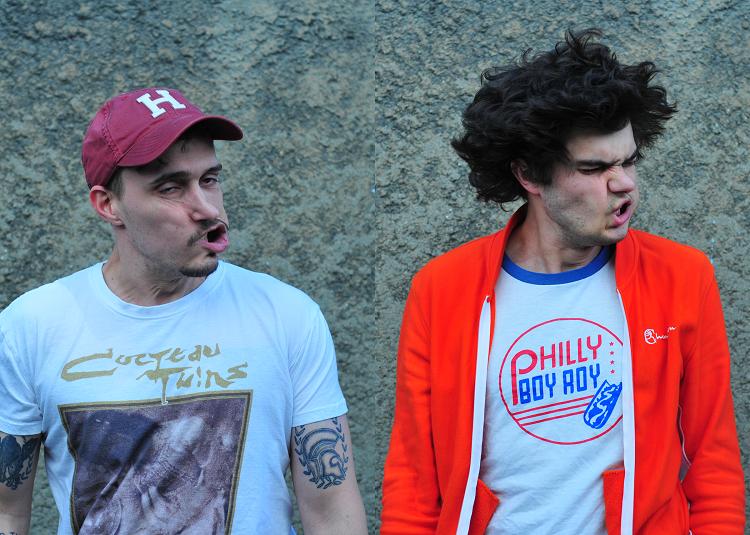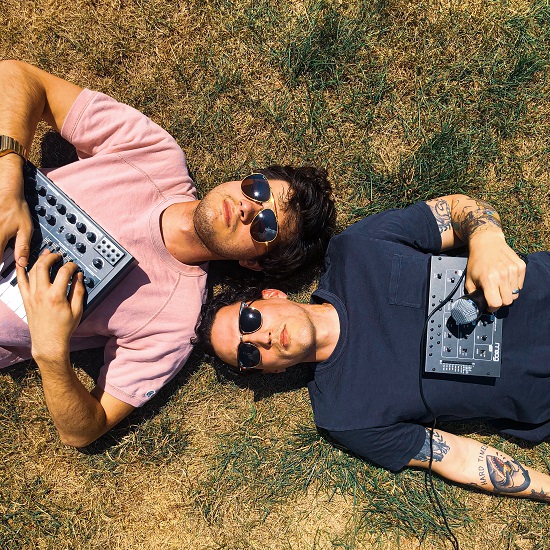
What inspired you to first start making music? And how did you come to be in your current incarnation? Or if you prefer, a brief bio about you.
Travis Benson: I got into punk around the age of 12 through a middle school friend of mine. Went to a ton of amazing shows with him and felt compelled to start a band. I had a very musical background growing up. I started playing guitar at age 12 and was a concert bassist for 7 years. The first real band I was in was this awful pop-punk band when I was 14. Ever since then, I have played every instrument in too many bands to count spanning across any subgenre of punk. I had a recent hiatus from 2010 until recently just because I didn’t have the time. When I moved to Boston for school, I met Quentin and we shared a lot of interests in music. We were trying to get a band started but never really had much of a direction. I ended up finding more free time when we were pulled from working in the hospital. I had started writing some stuff, put it on a cassette, then asked Quentin to get involved.
Quentin Moyer: I saw a bunch of high school kids play a show in 9th grade and thought “I want to do that.” A year later I played guitar in my first show. A year after that I was doing DIY punk stuff in central PA and saw my name printed on a ticket for the first time. To my surprise one of my classmates at HMS also had a substantial background in these antics and we’ve been trying to write ever since med school started. We first produced a track for my good friend Steve Beres’ comp You Can Sing Me Anything: A Tribute to 69 Love Songs as Shunt in the basement of the old residence hall. Finding ourselves isolated on sort of a furlough due to resource shortage at the peak of COVID in Boston we decided it was finally time to drum up a record.
Provide us with some info about your latest release…
QM: As Much Nothing as Possible, at least in title, harkens to what is essentially the core ethos of good medical care. It’s the cardinal law of The House of God, where I now work and have witnessed a staggering range of the human experience.
TB: As Quentin stated, the context of the album title comes from this core tenet that “the delivery of medical care is to do as much nothing as possible.” We’ve spent the last 3 years of our lives immersed in the medical field and have already witnessed our increasing jadedness based on the many flaws that are inherent to the medical system, both in the aspect of patient care and how trainees are treated. In a more tangible sense, the upcoming LP is a collection of six songs that is being released by a newer imprint called A La Carte Records, who we think is a real up-and-comer in the post-punk scene. This project is still in its infancy and I think that with each song we write, we get that much closer to honing our sound. In a genuine way, I think this album is a reflection of that. No two songs sound all the similar, yet I think they all fall into something that is ours. It kind of explores the corners of post-punk, coldwave, shoegaze, and synthpop.
Which ones would you consider your main influences both music-wise & non-music-wise?
TB:
QM: Most of my musical life I’ve just been failing at sounding like Red Fang or The Screaming Females. This is something completely different. Writing songs in True Faith has been sort of a step-wise process as most of it was conceived quarantined just passing files back and forth, and as someone who has never really written stuff like this before, coming up with material has mostly been a matter of intuition.
In what way does your sound differ from the rest genre-related artists/bands and why should we listen to your music? In other words, how would you describe your sound?
TB: I think Quentin’s genre-naivety just adds a different musical perspective. The truth is that, with over 40 years passing since the advent of these genres, no one is going to re-invent the wheel. Every basic idea, chord progression, emotion has all been sent out into the ether. I think that the only thing any musician can do at this point is to take the aspects they like of sounds that already exist and develop them further. While I can’t say we are exempt from emulation, I think that additional perspective that might be missing from other bands is just a little different. If we had to describe the sound, I think “post-punk” is a wide enough bucket to conveniently catch everything.
QM: In a way what we’ve done is inextricably linked to our experience as physicians in training and I like to think that As Much Nothing as Possible will always serve as a sign of these times. Does that automatically mean it’s good? Well, no.
Please name your 3 desert islands albums, movies & books…
QM: Without a doubt Richard Dawson’s Peasant, Titus Andronicus’ The Monitor, and Nick Drake’s Five Leaves Left
TB: Sparks “Kimono My House,” Wire “Pink Flag,” Cocteau Twins “Garlands.”

Do you prefer studio or performing live and why?
QM: There are few things more freeing than having the chance to be on stage and make a bunch of noise for a crowd (or even a “crowd”). Having a good time is so effortless too, deferring to the wisdom of NJ musician John Cozz: “even if it sucks, who cares.”
TB: Performing live, without a doubt. The studio is always fun because you can experiment in ways that are not reproducible in a live setting, but that will never replace the feeling of playing to a crowd of moderately interested people.
Is there any funny-unique story you would like to share with us, always in relation to your music ‘career’?
TB: Back in the early 2000’s, I was in a shitty KBD-style punk band. We had just put out a 7” and, for some reason, felt like we should do a West Coast tour to support it. It was a very haphazardly thrown together but we somehow managed to play shows with some incredible bands we had no business playing with at the time. The last show on the tour was at this punk house in Long Beach, CA and we were the first band to play. Not even 10 minutes into our set, the owner of the house rushes in and tells us to stop playing since the cops are here. Defeated, we stopped playing and started to put all of our gear away. The next band immediately starts setting up. We go up to the guy and asked what was going on since we didn’t see any cops. He said “oh, we just made that up so you guys would stop playing.”
QM: The first thing I ever performed on the guitar was Nirvana’s “All Apologies” in the 6th grade talent show. I didn’t really know the song that well and was only playing the guitar without singing or anything else and I’m pretty sure I just played the main verse for like 17 minutes until I just decided it was time to stop.
Which track of your own would you point out as the most unique and why?
QM: On “Waiting on the Wrong Time” the guitar is lower than the bass. Now that’s whacky!
TB: I think “Want” stands out the most on the LP, just because it has a different vibe. Best way I can describe it is “Chapterhouse meets New Order but with half the talent.”
Would you like to share with our readers your future plans?
TB: We know that we have a minimum of two years that we are living in the same area, so we are trying to capitalize on that as much as we can. Ultimately, we want to tour whenever it is safe to do so. Beyond the LP that is coming out soon, we have entered the next phase of just writing as much as we can.
QM: Medicine is all about future plans, but the continued role of True Faith remains unknown. It was unhindered by isolation and embroilment in the COVID healthcare environment, who’s to say where it will go with our future careers as physicians?
Free question!!! (Ask yourself a question) you wish to answer and haven’t been given the opportunity…
“Did you eat a can of smoked herring for lunch?”
QM: Yes
TB: No
Curated by: Christos Doukakis
Recommended listening:
.
.
.
Connect with True Faith:
Instagram: @truefaithx
Facebook: http://www.facebook.com/truefaithx
Bandcamp: http://truefaithx.bandcamp.com
